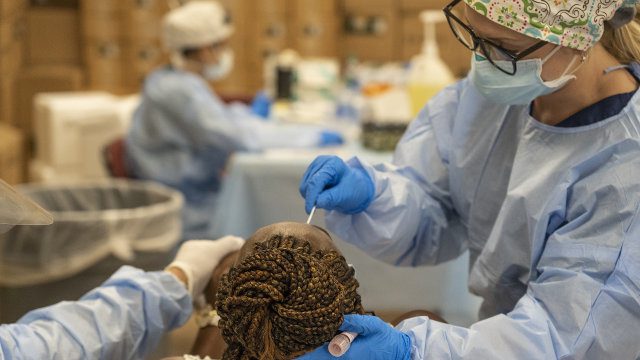The low-cost, rapid-response test could be administered in a doctor’s or school nurse’s office and uses technology similar to home pregnancy tests. It returns results in about 15 minutes.
The emergency approval comes as demand grows for greater access to Covid-19 diagnostic tools that deliver results in minutes, rather than days to help quickly contain infections.
Some public-health officials and lab executives say lower-cost rapid tests that can be produced at scale are an important factor in the country’s ability to return to work and school.
Abbott’s new test, called the BinaxNOW COVID-19 Ag Card, searches for virus proteins and is intended to be used for patients within seven days of feeling coronavirus symptoms. It involves a nasal swab administered by a health-care professional such as a doctor, school nurse, or pharmacist. The swab is inserted into the card-like test.
The new test uses lateral flow technology that is similar to a home pregnancy test and can be linked to a mobile-phone app that gives an all-clear code, for instance, to those who test negative at work or school. The company hasn’t yet determined its distribution strategy, an Abbott spokeswoman said, so it is unclear where the tests will be sent or when they will become available.
The new tests are intended to be conducted by medical professionals and aren’t sold directly to consumers for at-home use.
Other rapid-response tests that have received emergency-use authorizations from the FDA run in cartridges that are analyzed by boxlike machines that can sit within doctor’s offices or nursing homes. Those tests generally cost $15 to $50, though coronavirus diagnostic tests are typically free for people with symptoms or known contact with an infected individual.
The demand for rapid antigen tests and the machines that run them outstrips what their manufacturers are able to produce.

Abbott said its data show the new antigen test has demonstrated sensitivity—the percent of positive cases a test accurately detects—of about 97%. Rapid antigen tests are generally thought to be less sensitive than lab-based PCR tests.
The company earlier this year began investing in two U.S. production facilities to produce large numbers of the new tests, said John Hackett, divisional vice president of applied research and technology for Abbott’s diagnostics unit.
The company makes several other types of coronavirus tests including a rapid molecular test used by the White House that delivers results in under 15 minutes. The company revised instructions for use of that rapid test after a preliminary study by a major medical center found that it frequently gave false-negative results.
Many states raced to secure those tests, with some frustrated over how long it took to have orders filled. The federal government has purchased large numbers of rapid-response Covid-19 tests through the pandemic and typically gets priority distribution.
This article was originally published on the Wall Street Journal here.
